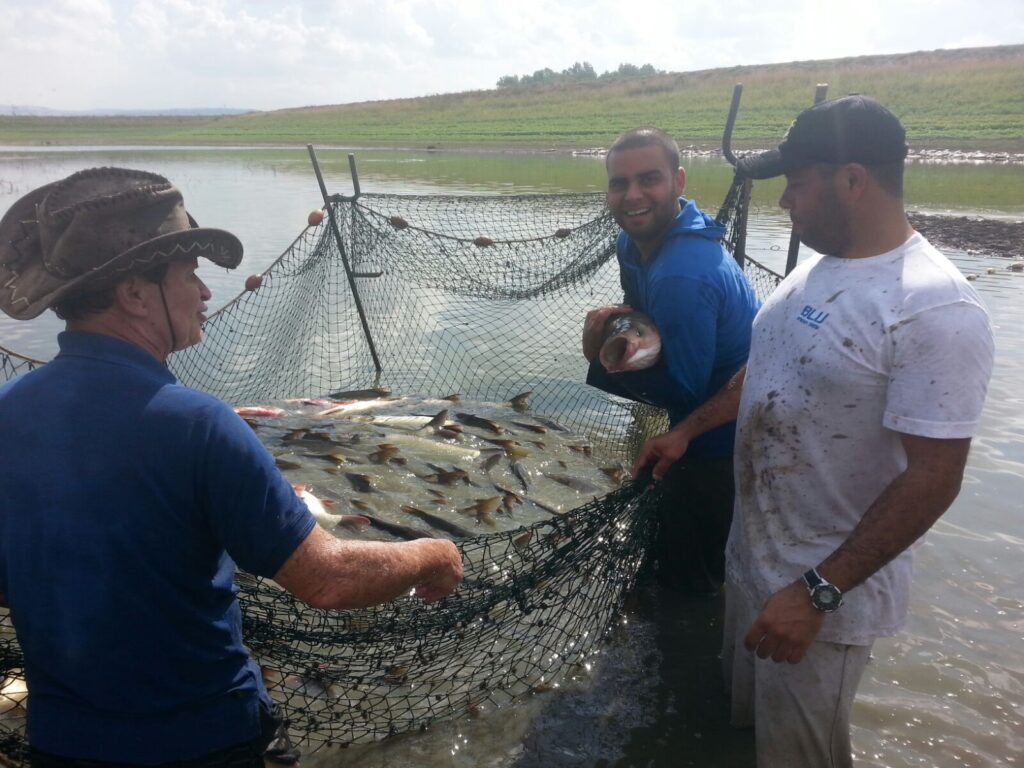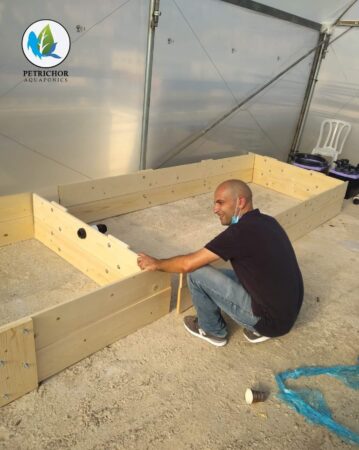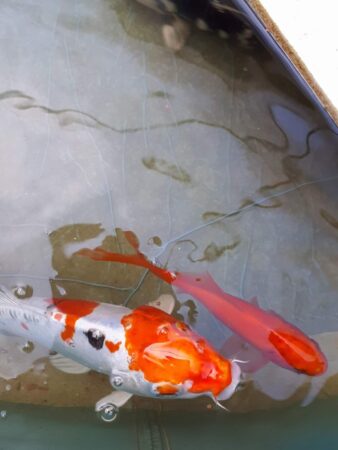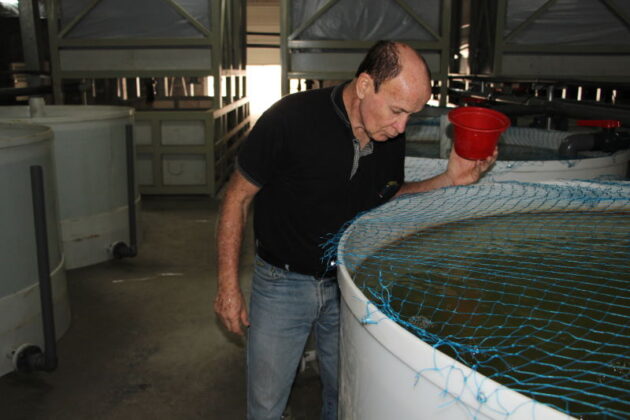
Features
Farming in conflict
As conflict persists in Israel and Palestine, fish farming becomes increasingly difficult
February 1, 2024 By Jean Ko Din and Seyitan Moritiwon
 Israeli aquaculturist, Ofer Berzak (on the left), says the fish farming industry has yet to feel the impacts of the war but hopes that peace is on the horizon. (Photo: Ofer Berzak)
Israeli aquaculturist, Ofer Berzak (on the left), says the fish farming industry has yet to feel the impacts of the war but hopes that peace is on the horizon. (Photo: Ofer Berzak) Maroof Rabba’ was running a small aquaponics farm when conflict broke out on the Gaza Strip last October.
Oct. 7, 2023 was a regular working day for Rabba’. Petrichor Aquaponics was still a young business that he was looking to grow in Nablus, in the West Bank of Palestinian territory. But when Hamas launched a surprise attack on Israel, the explosion of violence that has escalated in the region halted his dreams for his aquaculture business.
“I was having a regular working day at the base of my project considering no possibility for a big event like that to happen, counting on the fact that this project can survive as always with its own resources for very short periods of possible blockage, as what always happened before, and not thinking at all of such a crisis to occur,” said Rabba’, recounting the day that has led to one of the deadliest conflicts the region has seen since the 1973 Yom Kippur War.
Closed for business
Since heavy warfare escalated, Rabba’ has been forced to close his business. Ongoing activity on the Gaza Strip made day-to-day operations difficult, especially in transporting supplies to and from his farm.

(Photo: Maroof Rabba’)
“We suffer from a strict siege around West Bank and Gaza, checkpoints everywhere, blockage between the cities and continuous incursions and military operations inside the Palestinian communities with destruction (of) buildings, facilities and infrastructure,” said Rabba’.
“Add to that the absence of possible import of live species either from abroad or even from Israeli merchants… The same mentioned circumstances are also for fish food and breeding supplies. As a new project in such a newly created market of aquaponics and aquaculture, we definitely did not have the business capacity to be ready with a huge storage of tools or raw materials.”
Rabba’ said he is still waiting for “things to calm down a bit” to restart the operation in hopes of recovering more than 100,000 Israeli New Shekels (US$27,300) in losses. He sold what fish stocks and aquatic plants he had in hopes of recouping some costs in maintenance, feed and other operational costs.
“We were pushed to sell with losses instead of losing everything, as the demand stopped on aquaponic systems in general,” he said. “I wish to restart as soon as possible from the point of development my project reached right before the 7th of October. However, working again on building this market will never be an easy task.”
Hostile conditions
According to an Al Jazeera report, the Israel-Arab peace process was signed in 1993 under the Oslo Accords. As a result, Israel is obligated to permit fishing up to 20 nautical miles, but it has not been implemented.
However, as far back as 2007, there have been reports of Israel imposing an air, land and sea blockade on the Gaza Strip, because Gaza is governed by Hamas which Israel sees as a terrorist organization. Gaza is a territory along the Mediterranean Sea that borders Egypt to the south.
These restrictions have affected how far Gaza fishermen go in the sea and how much fish they can catch. They have a fishing zone limit of six nautical miles in the north and 15 nautical miles in the east. But many of them don’t have the equipment or fuel to make it all the way out to the allocated limit.
If Palestinian fishermen move too close to the limit, they risk their boats being seized and damaged, or fishermen could end up arrested. All of these have made it too expensive to operate and reduced the size of their catch.
Locals took matters into their own hands, opening up fish farms to create new sources of income and food security. According to a 2016 story by The Guardian, four fish farms have sprung up in Gaza since the 2014 war with Israel.
Origins of a fish farm
The idea for Petrichor Aquaponics was established in 2014 in Nablus, in the West Bank of Palestinian territory. Rabba’ invested his money in this new business pursuit and spent the first few years of the project introducing this new concept of agriculture into the Palestinian market which initially proved difficult.
Rabba’ began his professional career as an accountant, but he began to teach himself aquaponics with a personal mission to introduce a new way of approaching agriculture and food security in Palestine. Aquaponics combines the cultivation of plants in water and aquaculture, where fish eat and produce waste thereby acting as fertilizer for growing plants.
“We spent the first years of this young project trying to insert this new concept of agriculture in the Palestinian market which was a sensitive and hard mission,” he said. “Now we can observe an escalating curve of demand for this technique of agriculture as it is getting more famous and accepted.”

(Photo: Maroof Rabba’)
As business picked up, he expanded in 2017. He purchased a small-scale aquaculture unit of about 4,500 litres, cultivating koi fish. The demand for the aquaponics market continued to increase causing Rabba’ to cultivate other species of fish like tilapia, crayfish, river cooter turtles, and catfish on a small scale.
“However, all of that had created a very complicated situation that made it already a high-risk decision to start any kind of even a simple business. So, holding your business all of that long period of time was a difficult battle,” Rabba’ said.
Progress together
In recent years, Israel and Palestine have been working together on agriculture and aquaculture initiatives intended to strengthen food security in the region.
In 2022, the Israeli Ministry of Agriculture and the Civil Administration helped fish farmers in the Palestinian Authority to increase the volume of fish they breed via two projects in Tulkarm and Jenin. The first project in Jenin produced between two and four tons of bass for the market in Palestine and ended after four years.
The project aimed to allow West Bank, Palestine residents to grow their food and strengthen food security for Palestinians. The Agriculture Ministry invested NIS 700,000 (US$182,192), providing financial support, equipment, food for the fish, water filters and training sessions for the local operators.
Guy Rubinstein, director of aquaculture at the Israeli Agricultural Ministry, told The Times of Israel last August 2023 that the goal of the projects was to allow Palestinians to grow their food independently, and promote knowledge acquisition among the local population.
The first pilot project had just finished earlier last year and was set to be taken over by a Palestinian investor, while the ministry continued to provide professional support. With the ongoing conflicts, these initiatives have come to a halt.
Waiting for peace
Ofer Berzak, CEO of Galidi Fish Farming Consultants in Israel, said although things were difficult when the war broke out, the war has yet to affect fish farming. “The fish farming industry in Israel was not harmed by the war and continues to produce the same amount of fish, and the import of raw materials for food is still unaffected,” said Berzak.

Ofer Berzak, CEO of Galidi Fish Farming Consultants. (Photo: Ofer Berzak)
Berzak said he was home in Haifa City when the war broke out last October. Although the war may not be over soon, he doesn’t believe that the fish farming sector in Israel will take a hit. “All fish production in Israel is for self-consumption. No fish are exported from Israel due to their high price,” said Berzak.
As a consultant for projects in several countries, he hopes these countries will continue to work with him as they did before the war and is hopeful the war will end soon. “We want to live in peace with all our neighbours,” he said.
Print this page
Advertisement
- New director selected for BioMar and Viet Uc joint venture
- Attendees call for more farmer-centred program for AFRAQ conference





